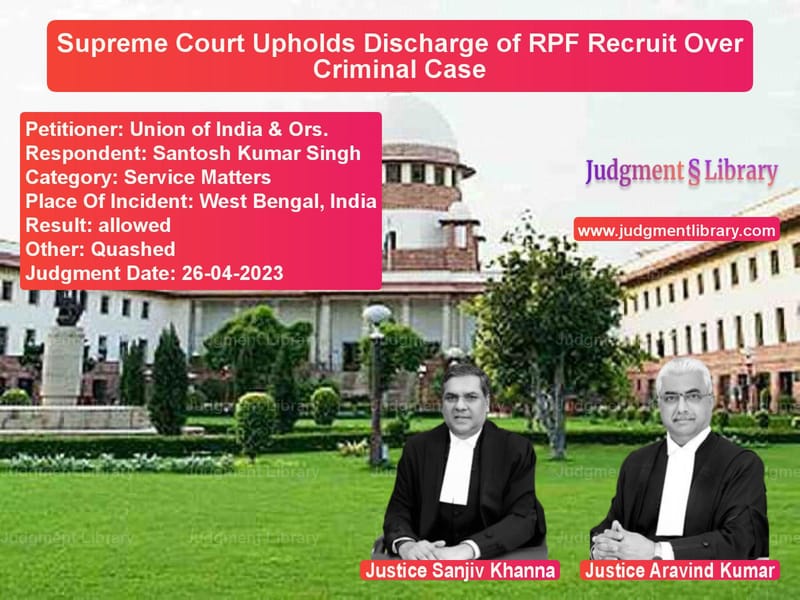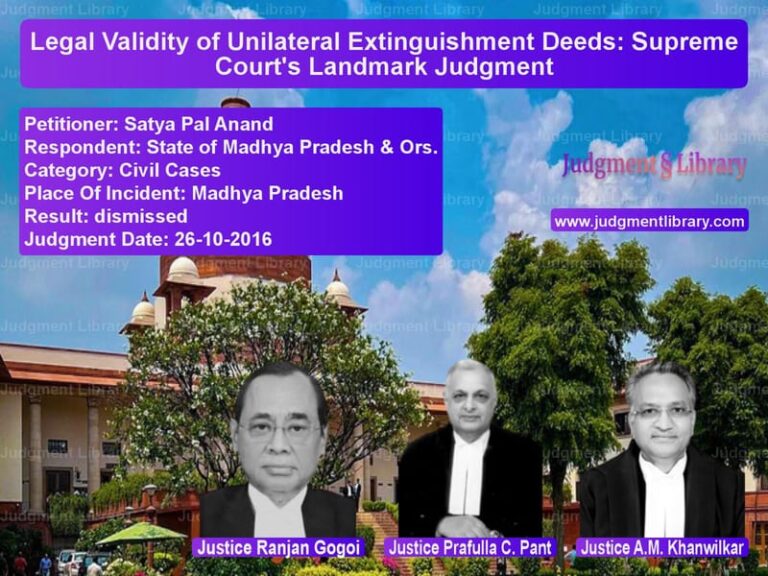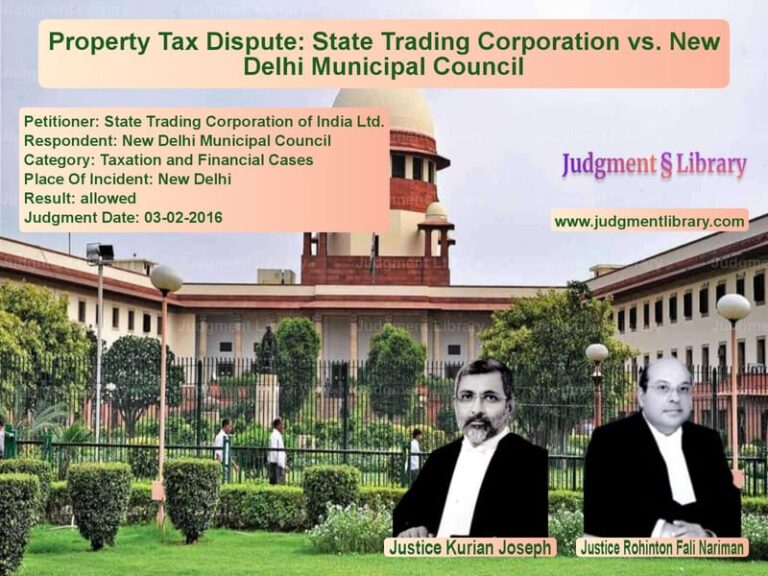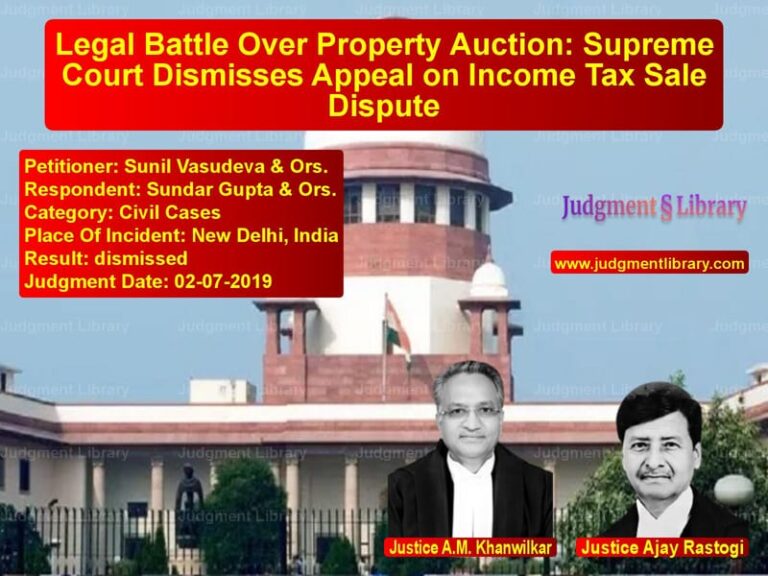Supreme Court Upholds Discharge of RPF Recruit Over Criminal Case
The Supreme Court of India recently ruled in favor of the Union of India in a case involving the discharge of a Railway Protection Force (RPF) recruit, Santosh Kumar Singh. The ruling clarifies the principles governing employment in disciplined forces, particularly when a recruit has a criminal background. The Court upheld the discharge, emphasizing that mere acquittal in a criminal case does not automatically entitle an individual to employment in a law enforcement agency.
Background of the Case
The case concerned Santosh Kumar Singh, who was selected as a Constable in the RPF on compassionate grounds. He was permitted to join the training program on March 1, 2009. As per the terms of his recruitment, his antecedents were subject to verification before formal appointment. During this verification process, it was discovered that a First Information Report (FIR No. 18 of 2009) had been registered against him on February 16, 2009, at Mashrak Police Station, Bihar. The charges included serious offenses under Sections 304-B, 498-A, 302, and 201 read with Section 34 of the Indian Penal Code, 1860, along with Sections 3 and 4 of the Dowry Prohibition Act, 1961.
Upon receiving this information, the RPF authorities discharged Santosh Kumar Singh from service on April 23, 2010, citing Rules 52.2 and 67.2 of the Railway Protection Force Rules, 1987. These rules allow for the discharge of a recruit found unsuitable for service based on antecedent verification.
Following his acquittal in the criminal trial on September 23, 2015, Santosh Kumar Singh sought reinstatement in the RPF. When his request was denied, he filed a writ petition before the Calcutta High Court in 2016. A Single Judge dismissed the petition, but on appeal, the Division Bench of the High Court ruled in his favor, directing his appointment in the RPF within four weeks. The Union of India then appealed this decision before the Supreme Court.
Petitioner’s Arguments (Union of India)
- The RPF is a disciplined force, and integrity and character are crucial for recruitment.
- Rules 52.2 and 67.2 of the RPF Rules provide clear grounds for discharging a recruit whose antecedents are found to be unsuitable.
- The recruit failed to disclose the FIR during the verification process, undermining the trust required for a law enforcement officer.
- The High Court’s decision disregarded the fact that acquittal in a criminal trial does not guarantee suitability for law enforcement duties.
- The delay of nearly six years in challenging the discharge order was unjustifiable.
Respondent’s Arguments (Santosh Kumar Singh)
- He was acquitted in the criminal case, and therefore, there was no legal basis for denying him employment.
- The charges were false and politically motivated.
- He had already undergone training and was fully qualified for the job.
- The rejection of his reinstatement application was arbitrary and unfair.
- The High Court correctly held that his discharge was unjustified after his acquittal.
Supreme Court’s Observations
- The Court reiterated that mere acquittal does not automatically entitle a candidate to employment in a disciplined force.
- Employers in law enforcement have the right to assess the suitability of candidates beyond the question of legal innocence.
- The RPF Rules explicitly allow for the discharge of recruits found unsuitable during antecedent verification.
- The nature of the allegations—dowry death and murder—were serious, even if the trial resulted in acquittal.
- There was no procedural lapse in the discharge decision, and it was made in the interest of maintaining discipline and integrity within the force.
Key Judicial Findings
- The Supreme Court held that the discharge was lawful and within the discretion of the RPF authorities.
- It reaffirmed the principle that law enforcement agencies have the right to reject candidates based on character verification, irrespective of acquittal in criminal cases.
- The Court emphasized that maintaining public confidence in a disciplined force is paramount and cannot be compromised by appointing individuals with questionable backgrounds.
Final Judgment
The Supreme Court ruled in favor of the Union of India:
- The Calcutta High Court’s order directing reinstatement was set aside.
- The discharge order of April 23, 2010, was upheld.
- Santosh Kumar Singh’s writ petition was dismissed.
Implications of the Judgment
The ruling has far-reaching implications for recruitment in law enforcement agencies:
- Stringent Character Verification: This judgment reaffirms that law enforcement agencies have the right to deny employment based on character and antecedent verification, even if the candidate has been acquitted in a criminal case.
- Employment in Disciplined Forces: The Court emphasized that suitability for law enforcement is not determined solely by legal acquittal but also by the need to maintain discipline and public trust.
- Precedent for Other Government Jobs: The ruling strengthens the government’s position in rejecting candidates with criminal antecedents for sensitive positions.
- Judicial Oversight in Employment Decisions: The decision underscores the principle that courts should be cautious in interfering with employment decisions made by expert bodies tasked with maintaining law and order.
Conclusion
The Supreme Court’s ruling in Union of India v. Santosh Kumar Singh reinforces the need for high integrity standards in disciplined forces. By upholding the discharge of a recruit facing serious criminal charges, the Court has sent a clear message that law enforcement agencies must have the discretion to assess the suitability of candidates beyond just their legal status. This judgment ensures that public trust in law enforcement agencies is not compromised and sets a precedent for similar cases in the future.
Petitioner Name: Union of India & Ors..Respondent Name: Santosh Kumar Singh.Judgment By: Justice Sanjiv Khanna, Justice Aravind Kumar.Place Of Incident: West Bengal, India.Judgment Date: 26-04-2023.
Don’t miss out on the full details! Download the complete judgment in PDF format below and gain valuable insights instantly!
Download Judgment: union-of-india-&-ors-vs-santosh-kumar-singh-supreme-court-of-india-judgment-dated-26-04-2023.pdf
Directly Download Judgment: Directly download this Judgment
See all petitions in Employment Disputes
See all petitions in Disciplinary Proceedings
See all petitions in Termination Cases
See all petitions in Judgment by Sanjiv Khanna
See all petitions in Judgment by Aravind Kumar
See all petitions in allowed
See all petitions in Quashed
See all petitions in supreme court of India judgments April 2023
See all petitions in 2023 judgments
See all posts in Service Matters Category
See all allowed petitions in Service Matters Category
See all Dismissed petitions in Service Matters Category
See all partially allowed petitions in Service Matters Category







